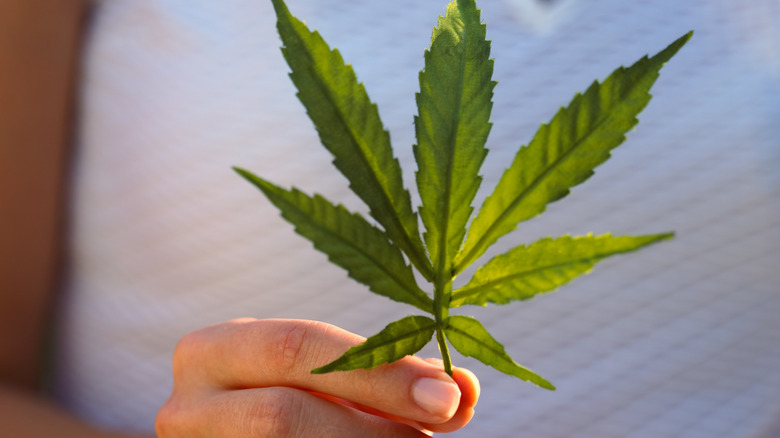When You Smoke Marijuana Every Day, This Is What Happens To Your Memory
When in a social gathering that includes frequent marijuana users and those who've never tried it, there's usually a few people from the "not tried it" camp who talk about the memory problems that come with smoking cannabis. And they aren't necessarily wrong. The effects on short- and long-term memory owing to the consumption of marijuana have been a topic of interest for a long time.
In fact, according to a 2013 Northwestern Medicine study, teenagers who smoked marijuana every day for three years even had abnormally shaped brains. Matthew Smith, lead author and assistant research professor in psychiatry and behavioral sciences at Northwestern University Feinberg School of Medicine, shared (via Northwestern Now) that the effects of chronic marijuana use (one of which was poor working memory) were seen as far as two years after the participants stopped consuming weed. A 2022 study published in the journal Addiction found residual effects between acute cannabis consumption and poor verbal learning and memory and small to moderate marijuana use with impaired executive functioning (think planning, time management, and self-monitoring).
It is not a secret that consuming marijuana has an immediate effect on your brain and your body, which is one of the reasons proponents of cannabis use turn to the drug for anxiety relief. As explained by Dr. Sharon Levy, director of the Adolescent Substance Use and Addiction Program at Boston Children's Hospital (via NBC News), consuming marijuana floods your brain (which already has the capacity to produce its own calming endocannabinoids) with the psychoactive plant chemical THC (tetrahydrocannabinol).
If you or anyone you know needs help with addiction issues, help is available. Visit the Substance Abuse and Mental Health Services Administration website or contact SAMHSA's National Helpline at 1-800-662-HELP (4357).
How the chemicals in marijuana affect your memory
Research pertaining to consistent marijuana use and its effect on memory is ongoing, but the fact that it has an impact on short-term memory is pretty obvious, per Harvard Health. It all has to do with how the different compounds in marijuana affect your brain. While cannabidiol (CBD) can be beneficial for those with anxiety, THC can attach to certain receptors in your brain responsible for memory formation and temporarily disrupt neural signaling. This is why someone who's high on weed might display a lack of interest in things, or have difficulty concentrating or grasping something they learned (via The Conversation).
As for the effects of marijuana use on long-term memory, research led by Matthew Smith (which was also published in the journal Hippocampus) is relevant. Even though the young adults in the study had abstained from cannabis use for about two years, when they were tested for long-term memory using assessments, they performed poorly when compared with participants who'd never used cannabis (via TIME).
Interestingly, a 2019 study published in the journal PNAS found a link between just one puff of weed and "false memories": remembering something that wasn't there or remembering something differently than how it happened, per CNN. "We are all prone to the formation of false memories, independent of cannabis use. The susceptibility for false memory, however, increases with cannabis. Under cannabis, users can easily accept fake truths for true memory," explained Johannes Ramaekers, lead author and professor of psychopharmacology at Maastricht University in the Netherlands.
What does this mean for marijuana use?
The conversation around marijuana use and memory problems has also been likened to a chicken-and-egg discussion. Dr. Igor Grant, director of the Center for Medicinal Cannabis Research at the University of California, San Diego, told NBC News that he isn't entirely sure that cannabis use has negative effects on long-term memory. And according to Joanna Jacobus, an associate professor of psychiatry at the University of California San Diego, there might be biological differences in adolescent brains that can create a greater likelihood that they'll start smoking marijuana (via American Psychological Association).
Nevertheless, there is sufficient data to be concerned about smoking marijuana every day and what this can mean for adolescents whose brains are still developing. Even temporary cognitive impairments can have a ripple effect: Fail to remember something you've learned for a test, fare poorly in it, be negatively affected by the outcome (poor grades), and ultimately lose confidence in yourself. There is also concern regarding just how much THC is in different kinds of marijuana these days: what was originally a mere 3% has grown to up to 90% in newer samples, said Carrie Cutter, director of the Health and Cognition lab at Washington State University (via NBC News). Perhaps the lesson here is to tread with caution, whether you're an adolescent or an adult. Understand the risks to memory and make informed decisions about just how much cannabis you should be consuming — or whether you should at all.


